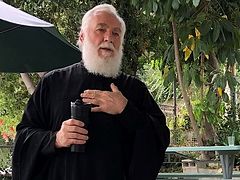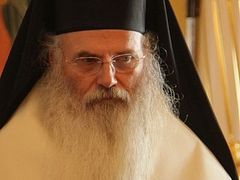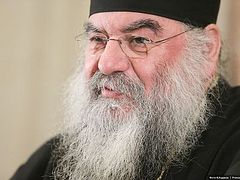Someone once asked me, "How do I know that I’m leading a proper life in the Church? Some often go to church, pray, participate in the services, partake of the Sacraments, but I do not see any noticeable changes in their lives, or rather, I see the same kind of people in the world; I was expecting more from them. What are the signs of a proper church life?”
I cannot say that there are a certain number of signs. God does the “calculations”, because the changes are internal, secret, hidden from us externally. On the one hand, only you and God know about what is happening in the recesses of your soul, and on the other, some things are determined by your behavior with your spouse, children, with others. Some older people say, “I have been going to church since I was a child.” So what? What is the result? What have you achieved over the years? I mean, you can’t say that you’ve been going to a gym, say, for five years and five months, and that you had a weight of eighty kilos, but now you weigh 110 kilos. Or that you’ve been learning English for many years, but when you get to the airport you’re not capable of coherently putting together two or three words. When you say that you are near Christ, there will be fruit, there is no other way. Your inner life will somehow be made manifest on the outside. When you approach Christ, you obtain happiness not from the outside, but inside yourself; that is, you do not grieve over certain events, you do not get disappointed over trifling matters. Someone says something and you are offended; the weather is bad out on the street and you fall into melancholy; whereas one who succeeds in the spiritual life feels peace and tranquility in the depth of his heart, and this is made manifest in all his actions. St. Isaac the Syrian said: “Imagine saying to a drunken man: ‘Your house is on fire.’ And he replies: ‘No worries, let it burn’.” This is a metaphor, of course. Your inebriation, on the other hand, your happiness, is what the Church calls blessedness. When you have the bliss of the Holy Spirit within you, no external factors can disturb your inner peace.
I remember the following words of Mother Gabriela: “There is not a man yet born who could hurt my soul, who could take away my joy.” Why is that so? Of course, there were people who annoyed her, offended her, disturbed her, slandered her. But how you behave with others is your own problem. How you answer them depends on your life stance, and your life stance is a matter of personal choice. What you want is what you answer them. If you start to get nervous and shout, then I perceive, according to St. Porphyrios, that you are as one who is wounded, struck, and bleeding. If I see you in a state like this, then my behavior should be appropriate. We have to become more discerning, understanding both our own soul and our brother’s.
Once, a long time ago, I got angry at someone and started talking to him rudely, but he kept looking at me calmly. A long time afterwards I asked him, “How did you endure all that I said to you?” “I understood that you had some kind of problem. I didn't want to upset you any more, I didn't want to hurt you,” he said. Calmly listen to your neighbor, but do not get involved in his problem. This doesn't mean you’re dismissive of him. Try to understand him.
One day Fr. Paisios was traveling on a ship from Daphne to Ouranoupolis. He was offered a separate room for monks in order to avoid any worldly people. Geronda replied, “What for? Why should I sit alone, other than if I were hiding something? We’re all the same.” This is something very important. We have to realize that we are all brothers and sisters in Christ and are moving towards the same goal. The more you grow spiritually, the more you connect with your neighbor. When you come to understand the words of Christ about what it means to be a servant to your brother, you begin to understand what it means to wash the feet of another.





